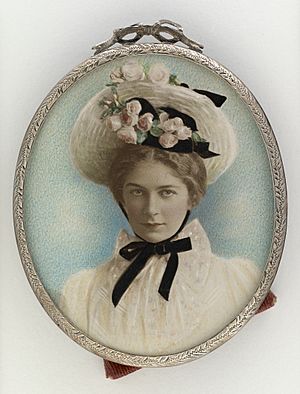Ethel Anderson facts for kids
Quick facts for kids
Ethel Anderson
|
|
|---|---|

Ethel Anderson, around 1905
|
|
| Born |
Ethel Campbell Louise Mason
16 March 1883 Leamington, Warwickshire, England
|
| Died | 4 August 1958 (aged 75) Sydney, Australia
|
| Occupation |
|
Ethel Campbell Louise Anderson (born Mason; 16 March 1883 – 4 August 1958) was an Australian writer and artist from the early 1900s. She was a poet, essayist, novelist, and painter. Even though she thought of herself mostly as a poet, people today know her best for her clever and funny stories. Ethel Anderson was known as an important author, artist, and supporter of new art styles called modernism.
Contents
Her Life Story
Ethel Anderson was born in Lillington, England, on 16 March 1883. Her parents, Cyrus Mason and Louise Campbell, were both born in Australia. Soon after she was born, her family moved back to Australia. She grew up in Sydney and on her grandfather's farm, Rangamatty, near Picton, New South Wales. She learned at home and also went to Sydney Church of England Girls' Grammar School (now SCEGGS Darlinghurst).
On 8 October 1904, she married Austin Thomas Anderson in Ahmednagar, Bombay. She had gone with him because he was stationed there for his army work. In 1907, they had a daughter named Bethia.
When World War I started, her husband was sent to France. Ethel moved to Cambridge, England. While there, she studied drawing at Downing College, Cambridge and showed some of her artwork.
Life in England
From 1914 to 1924, while in England, Ethel Anderson joined a group of artists in Cambridge. She met famous artists like Sir William Rothenstein. She painted large pictures on the walls (murals) for churches in England. She also started a group called the Young Worcestershire Arts and Crafts Club.
Later, the Andersons lived in Worcestershire. In 1924, her husband retired from the army, and the family moved back to Australia. They settled in Turramurra, New South Wales. From 1927, Brigadier Anderson worked as a secretary for several State Governors.
Supporting Modern Art
In Sydney, Ethel Anderson became a big supporter of modern art. She helped artists like Grace Cossington Smith, Dorrit Black, Roland Wakelin, and Roy de Maistre. She wrote about their art, held art shows in her own home, and helped organize exhibitions in other places. She also gave speeches at art show openings. She wrote articles about modern art and artists for different Australian magazines. For example, in 1930, she even moved all the furniture out of her house to hold an exhibition of Roland Wakelin's paintings!
In 1927, Ethel Anderson started the Turramurra Wall Painters Union in Turramurra. The leader of St James' Church, Sydney asked her to help decorate the Children's Chapel. She designed a plan for a mural, and her artist group painted it in 1929.
On 16 March 1932, she opened the first art show at the Modern Art Centre. This center was started by Dorrit Black to teach and share new art ideas she learned in France. Anderson also wrote about artists for magazines like Art in Australia and Home. Her poems and stories were printed in famous magazines such as The Spectator, Punch, the Cornhill Magazine, The Atlantic Monthly, The Sydney Morning Herald, and The Bulletin. Her poetry was inspired by her knowledge of French literature and new art styles. She liked to try new ways of writing poems, playing with their form and rhythm. Her poem The Song of Hagar was even turned into music by John Antill.
After her husband passed away in 1949, Ethel needed to support herself. She did this through her writing. Her first novel, At Parramatta, was published in parts in The Bulletin magazine. She died on 4 August 1958 in Sydney.
Her Works
Poetry Books
- Squatter's Luck and Other Poems (1942)
- Sunday At Yarralumla: A Symphony (1947)
- The Song of Hagar to the Patriarch Abraham (1957)
Non-fiction Books
- Adventures In Appleshire (1944)
- Timeless Garden (1945)
- Joy of Youth: The Letters of Patrick Hore-Ruthven (1950, as editor)
Fiction Books
- Indian Tales (1948)
- At Parramatta (1956)
- The Little Ghosts (1959)
- The Best of Ethel Anderson (1973, edited by J. D. Pringle)
Paintings
- Murals in the Children's Chapel of St James' Church, Sydney (painted with her art group)
 | Stephanie Wilson |
 | Charles Bolden |
 | Ronald McNair |
 | Frederick D. Gregory |

